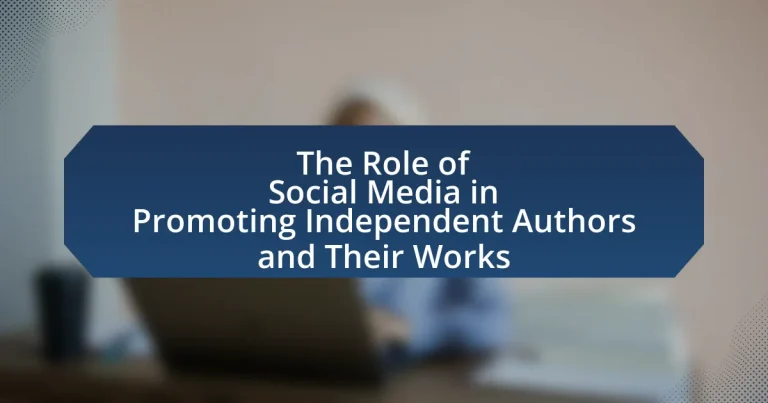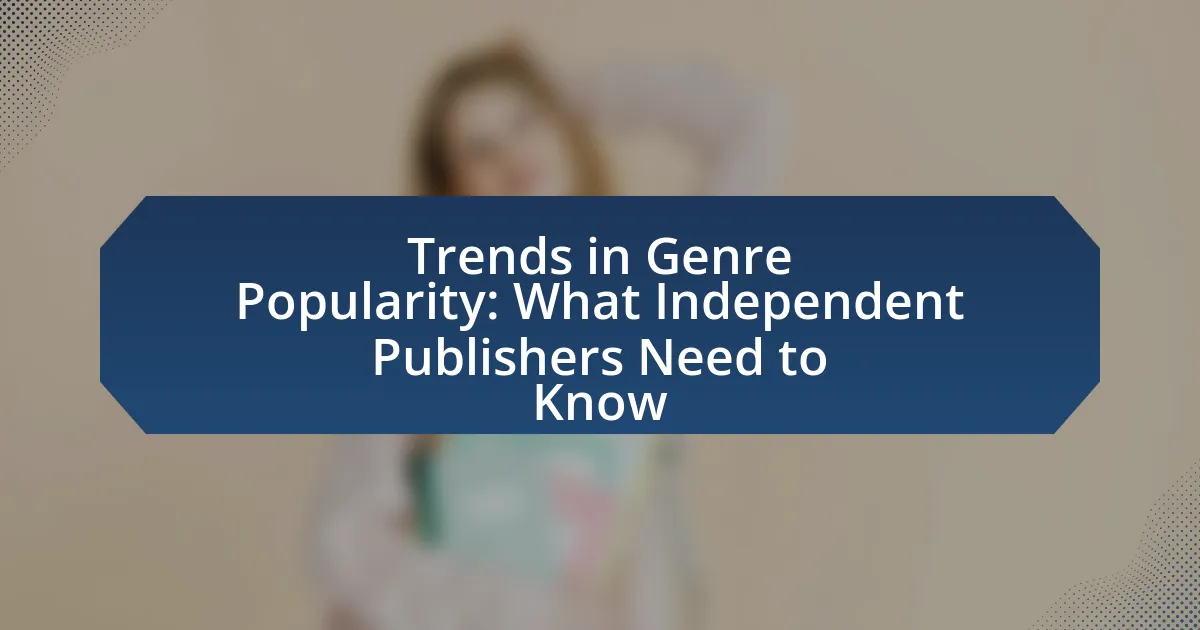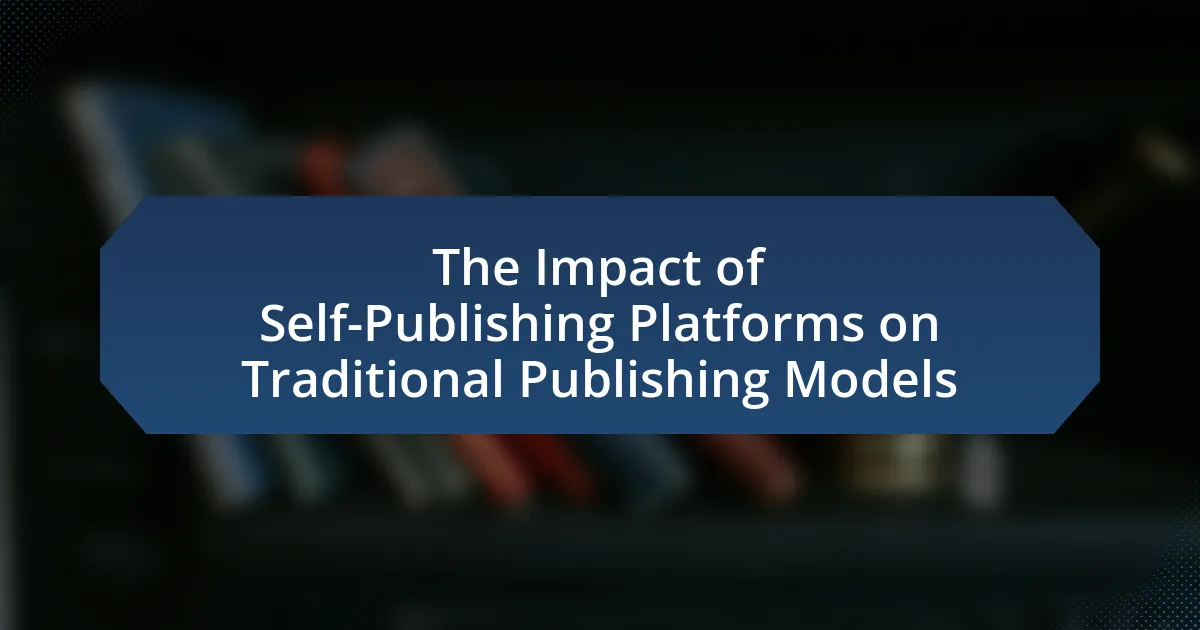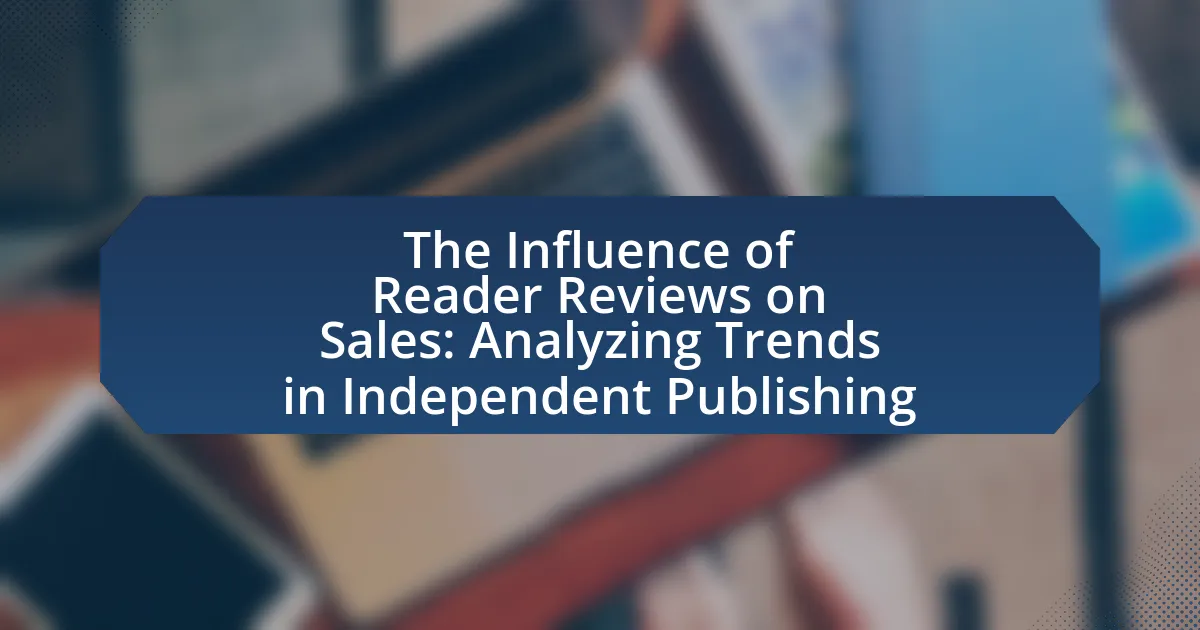The article examines the significant role of social media in promoting independent authors and their works. It highlights how platforms such as Twitter, Facebook, and Instagram enable authors to engage directly with readers, build their brand, and increase visibility through targeted advertising and community building. Key topics include the effectiveness of various social media platforms, the impact of algorithms on post reach, strategies for content creation, and the importance of audience engagement. Additionally, the article addresses challenges independent authors face on social media and offers practical tips for leveraging these platforms to enhance their marketing efforts and foster a loyal readership.
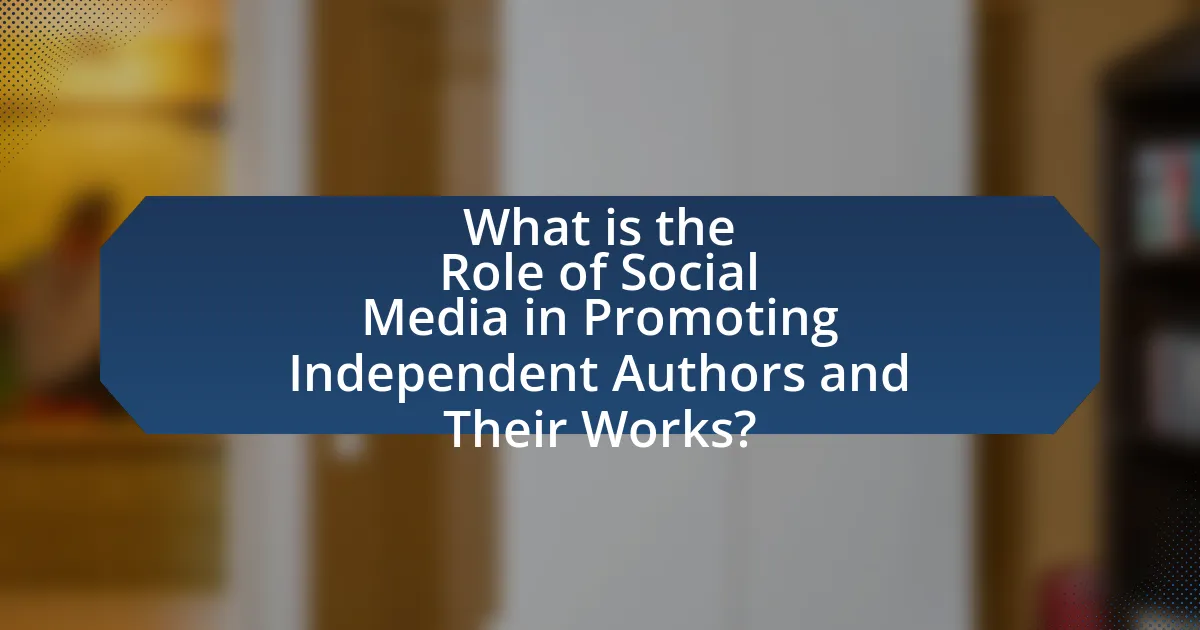
What is the Role of Social Media in Promoting Independent Authors and Their Works?
Social media plays a crucial role in promoting independent authors and their works by providing a platform for direct engagement with readers and facilitating the sharing of content. Independent authors utilize social media channels like Twitter, Facebook, and Instagram to build their brand, connect with their audience, and share updates about their books. According to a survey by the Pew Research Center, 69% of adults in the U.S. use social media, making it an effective tool for authors to reach a broad audience. Furthermore, social media allows for targeted advertising and community building, enabling authors to cultivate a loyal following and increase book sales.
How does social media influence the visibility of independent authors?
Social media significantly enhances the visibility of independent authors by providing them with platforms to reach wider audiences directly. Through channels like Twitter, Instagram, and Facebook, independent authors can share their work, engage with readers, and build a community without the need for traditional publishing intermediaries. For instance, a study by the Pew Research Center found that 69% of adults in the U.S. use social media, which allows authors to tap into a vast pool of potential readers. Additionally, social media algorithms often promote content based on engagement, meaning that posts from independent authors can gain traction and visibility if they resonate with users, further amplifying their reach.
What platforms are most effective for independent authors?
The most effective platforms for independent authors are Amazon Kindle Direct Publishing, social media networks like Facebook and Instagram, and author-centric platforms such as Goodreads. Amazon Kindle Direct Publishing allows authors to reach a vast audience and retain a significant portion of royalties, making it a primary choice for self-publishing. Social media networks facilitate direct engagement with readers, enabling authors to build a following and promote their works through targeted advertising and organic reach. Goodreads serves as a specialized platform where authors can connect with avid readers, gather reviews, and participate in community discussions, enhancing visibility and credibility. These platforms collectively provide independent authors with essential tools for marketing and distribution, supported by their large user bases and interactive features.
How do algorithms affect the reach of independent authors’ posts?
Algorithms significantly influence the reach of independent authors’ posts by determining which content is prioritized in users’ feeds. Social media platforms utilize algorithms that analyze user engagement, such as likes, shares, and comments, to decide the visibility of posts. For instance, a study by the Pew Research Center found that 64% of Americans believe social media has a significant impact on the way they receive news, indicating that algorithmic curation can either enhance or limit an author’s audience based on engagement metrics. Consequently, independent authors must optimize their content to align with these algorithms to maximize their reach and visibility.
Why is social media important for independent authors?
Social media is important for independent authors because it provides a platform for direct engagement with readers and potential fans. This engagement allows authors to build a personal brand, share their work, and create a community around their writing. According to a survey by the Author Earnings Report, 70% of independent authors who actively use social media report increased book sales, demonstrating its effectiveness in reaching a wider audience. Additionally, social media enables authors to participate in conversations, receive feedback, and promote their books through targeted advertising, further enhancing their visibility in a competitive market.
What advantages does social media offer over traditional marketing?
Social media offers advantages over traditional marketing by providing cost-effectiveness, broader reach, and enhanced engagement. Unlike traditional marketing, which often requires significant financial investment for print ads or television spots, social media platforms allow independent authors to promote their works at little to no cost. For instance, a study by HubSpot indicates that social media marketing costs 62% less than traditional marketing methods while generating more leads. Additionally, social media enables authors to connect directly with their audience, fostering real-time interaction and feedback, which is not possible with traditional marketing channels. This direct engagement can lead to stronger relationships and community building around an author’s work, ultimately driving sales and visibility.
How can social media help in building an author brand?
Social media helps in building an author brand by providing a platform for direct engagement with readers and the ability to showcase an author’s personality and work. Through consistent posting, authors can share insights into their writing process, promote new releases, and interact with their audience, which fosters a sense of community and loyalty. According to a survey by the Pew Research Center, 69% of adults in the U.S. use social media, making it a vital tool for authors to reach a broad audience and enhance their visibility. Additionally, social media algorithms favor engaging content, allowing authors to gain organic reach and attract new followers, further solidifying their brand presence.
What strategies can independent authors use on social media?
Independent authors can utilize targeted content creation, audience engagement, and strategic partnerships as effective strategies on social media. Targeted content creation involves sharing excerpts, behind-the-scenes insights, and relevant articles that resonate with their audience, which can increase visibility and interest in their works. Audience engagement is crucial; authors should actively respond to comments, participate in discussions, and host Q&A sessions to build a loyal community. Strategic partnerships with other authors or influencers can amplify reach; collaborations on joint promotions or guest posts can introduce authors to new audiences. These strategies are supported by data indicating that social media interactions can significantly enhance book sales and author visibility, as evidenced by a 2021 survey showing that 70% of readers discover new books through social media platforms.
How can authors create engaging content for their audience?
Authors can create engaging content for their audience by understanding their interests and preferences, then tailoring their writing to meet those needs. Research indicates that content that resonates with readers often includes relatable themes, storytelling elements, and interactive components, such as questions or prompts that encourage audience participation. For instance, a study by the Content Marketing Institute found that 70% of consumers prefer to learn about a company through articles rather than ads, highlighting the effectiveness of informative and engaging content. By leveraging social media platforms, authors can also gather feedback and insights directly from their audience, allowing them to refine their content strategy and enhance engagement further.
What role do hashtags play in promoting works on social media?
Hashtags play a crucial role in promoting works on social media by increasing visibility and engagement. They categorize content, making it easier for users to discover posts related to specific topics or themes. For instance, a study by TrackMaven found that posts with at least one hashtag receive 12.6% more engagement than those without. This demonstrates that hashtags not only enhance the reach of independent authors’ works but also connect them with targeted audiences interested in their genres or themes.
How can independent authors measure their success on social media?
Independent authors can measure their success on social media by analyzing engagement metrics such as likes, shares, comments, and follower growth. These metrics provide quantifiable data on how well their content resonates with the audience. For instance, a study by Sprout Social indicates that posts with higher engagement rates are more likely to reach a broader audience, thus enhancing visibility and potential book sales. Additionally, tracking website traffic from social media platforms using tools like Google Analytics can help authors assess how social media efforts translate into actual visits and conversions.
What metrics should authors track to evaluate their social media impact?
Authors should track engagement metrics, reach, follower growth, and conversion rates to evaluate their social media impact. Engagement metrics, such as likes, shares, and comments, indicate how well content resonates with the audience. Reach measures the number of unique users who see posts, providing insight into visibility. Follower growth reflects the expanding audience base, while conversion rates show how many followers take desired actions, such as visiting an author’s website or purchasing a book. These metrics collectively offer a comprehensive view of an author’s social media effectiveness in promoting their works.
How can feedback from social media inform an author’s writing and marketing strategy?
Feedback from social media can significantly inform an author’s writing and marketing strategy by providing real-time insights into audience preferences and engagement levels. Authors can analyze comments, shares, and likes to identify which themes, characters, or styles resonate most with their readers. For instance, a study by the Pew Research Center found that 69% of adults in the U.S. use social media, indicating a vast audience from which authors can gather feedback. This data allows authors to tailor their content to meet reader expectations, enhancing both the writing process and marketing efforts. Additionally, social media analytics tools can track engagement metrics, helping authors refine their promotional strategies based on what content drives the most interaction.
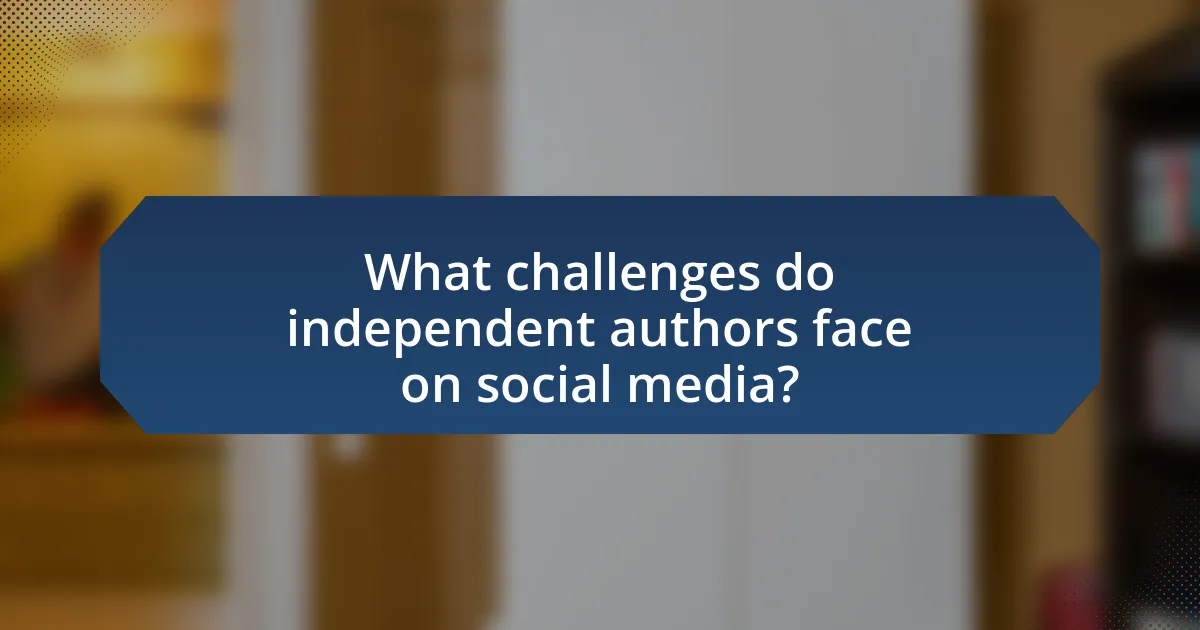
What challenges do independent authors face on social media?
Independent authors face several challenges on social media, including limited visibility, competition, and the need for effective engagement strategies. Limited visibility arises because social media algorithms often favor established authors or popular content, making it difficult for independent authors to reach their target audience. Competition is intense, as millions of authors vie for attention, leading to oversaturation in the market. Additionally, independent authors must develop effective engagement strategies to connect with readers, which requires time and expertise in marketing techniques that they may not possess. These challenges hinder their ability to promote their works effectively and build a loyal readership.
How can independent authors overcome the saturation of content on social media?
Independent authors can overcome the saturation of content on social media by focusing on niche marketing and building authentic connections with their audience. By identifying specific genres or themes that resonate with a targeted demographic, authors can create tailored content that stands out amidst the noise. For instance, a study by the Pew Research Center indicates that 69% of adults use social media, highlighting the vast audience available, but also the competition. Engaging directly with followers through interactive posts, live sessions, and personalized responses fosters a sense of community, making the author more memorable. Additionally, leveraging unique storytelling techniques and visual content can enhance visibility, as posts with images receive 94% more views than those without, according to a study by BuzzSumo.
What unique approaches can authors take to stand out?
Authors can stand out by leveraging niche marketing strategies that target specific audiences through social media platforms. By identifying and engaging with a particular demographic, authors can create tailored content that resonates deeply with their readers. For instance, using platforms like Instagram or TikTok, authors can share visually appealing snippets of their work or behind-the-scenes content, which has been shown to increase engagement rates significantly. According to a study by the Pew Research Center, 69% of adults in the U.S. use social media, making it a vital tool for authors to connect with potential readers directly. Additionally, collaborating with influencers or other authors in similar genres can amplify reach and credibility, further enhancing visibility in a crowded market.
How can authors deal with negative feedback or criticism online?
Authors can deal with negative feedback or criticism online by responding constructively and maintaining professionalism. Engaging with critics respectfully can help clarify misunderstandings and demonstrate a willingness to improve. Research indicates that authors who actively address criticism can enhance their reputation and foster a loyal readership. For instance, a study published in the Journal of Business Research found that positive engagement with negative feedback can lead to increased customer loyalty and trust.
What are the potential pitfalls of using social media for promotion?
The potential pitfalls of using social media for promotion include negative public perception, misinformation, and the risk of oversaturation. Negative public perception can arise from poorly received content or backlash against promotional tactics, which can damage an author’s reputation. Misinformation can spread rapidly on social media, leading to misunderstandings about an author’s work or intentions. Additionally, oversaturation occurs when audiences are bombarded with excessive promotional content, resulting in decreased engagement and interest. According to a study by the Pew Research Center, 64% of social media users have encountered misleading information, highlighting the risk of misinformation. Furthermore, research from HubSpot indicates that 70% of consumers feel overwhelmed by the amount of promotional content they encounter, underscoring the danger of oversaturation.
How can authors avoid common mistakes in social media marketing?
Authors can avoid common mistakes in social media marketing by developing a clear strategy that includes understanding their target audience and setting specific goals. Research indicates that 70% of marketers say that having a documented strategy is crucial for success in social media marketing. By identifying the demographics and preferences of their audience, authors can tailor their content to engage effectively. Additionally, authors should focus on consistent posting and interaction, as studies show that brands that engage with their audience on social media see a 20-40% increase in customer loyalty. Lastly, authors must analyze their performance metrics regularly to refine their approach, as data-driven decisions lead to improved outcomes in social media campaigns.
What ethical considerations should authors keep in mind when promoting their works?
Authors should prioritize honesty and transparency when promoting their works. This includes accurately representing their work, avoiding misleading claims about its quality or content, and disclosing any affiliations or sponsorships that may influence their promotion. For instance, the Federal Trade Commission (FTC) guidelines require influencers and authors to disclose paid partnerships to ensure that audiences are aware of potential biases. Additionally, authors should respect copyright laws and avoid using others’ content without permission, as this can lead to legal repercussions and damage their credibility. By adhering to these ethical considerations, authors can build trust with their audience and maintain integrity in their promotional efforts.
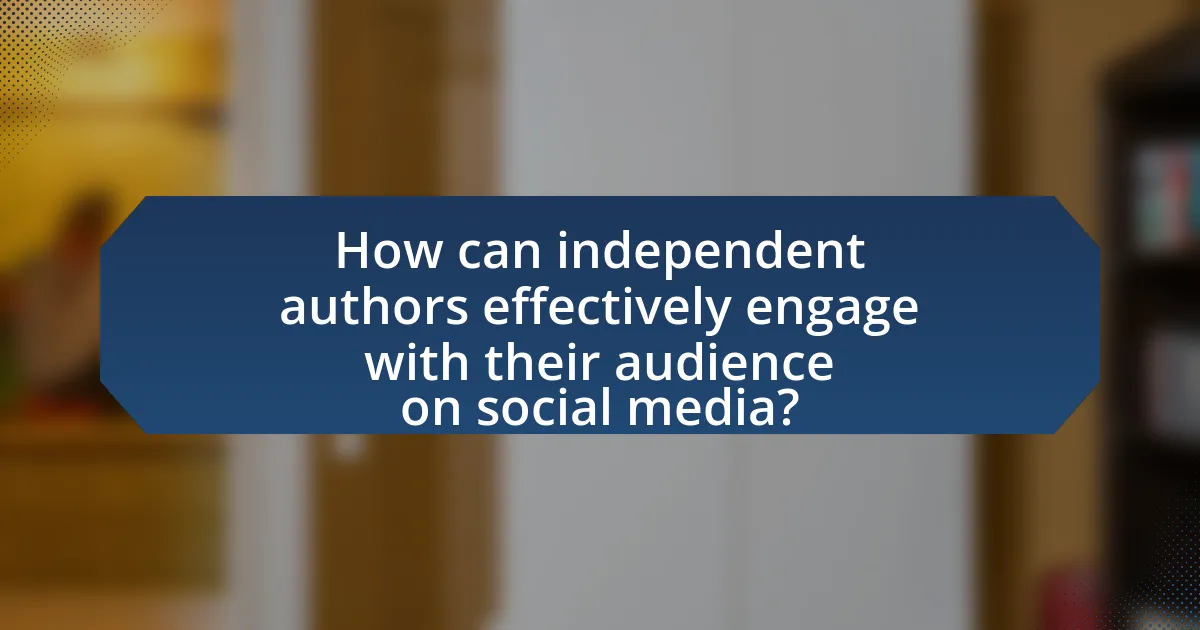
How can independent authors effectively engage with their audience on social media?
Independent authors can effectively engage with their audience on social media by consistently sharing authentic content that resonates with their readers. This includes posting updates about their writing process, sharing snippets of their work, and interacting directly with followers through comments and messages. Research indicates that 70% of consumers feel more connected to brands when the CEO is active on social media, highlighting the importance of personal engagement for authors. Additionally, utilizing platforms like Instagram and Twitter for visual storytelling and real-time interactions can significantly enhance audience connection, as these platforms have shown to increase engagement rates by up to 50% when authors actively participate in conversations.
What types of content resonate most with readers on social media?
Visual content, particularly images and videos, resonates most with readers on social media. Research indicates that posts with visuals receive 94% more views than those without, highlighting the effectiveness of engaging imagery. Additionally, storytelling content, such as personal anecdotes or relatable narratives, fosters emotional connections, leading to higher engagement rates. According to a study by BuzzSumo, articles that include storytelling elements are shared 22 times more than those that do not. Furthermore, interactive content, such as polls and quizzes, encourages participation and increases user interaction, making it a powerful tool for authors to engage their audience.
How can authors use storytelling to connect with their audience?
Authors can use storytelling to connect with their audience by creating relatable characters and situations that evoke emotions. This emotional engagement fosters a sense of connection, as readers often see reflections of their own experiences in the narratives. For instance, studies show that stories that include personal anecdotes or universal themes, such as love, loss, or triumph, resonate more deeply with audiences, leading to increased empathy and understanding. Additionally, authors can leverage social media platforms to share snippets of their stories, engage in conversations about their characters, and invite readers to share their interpretations, further enhancing the connection.
What role do live events and Q&A sessions play in audience engagement?
Live events and Q&A sessions significantly enhance audience engagement by fostering direct interaction between authors and their readers. These formats create opportunities for real-time dialogue, allowing authors to address questions, share insights, and build a personal connection with their audience. Research indicates that 70% of participants in live events feel more connected to the author, which can lead to increased loyalty and support for their work. Additionally, live interactions can generate immediate feedback, enabling authors to understand audience preferences and adapt their marketing strategies accordingly.
What are best practices for building a loyal following on social media?
To build a loyal following on social media, independent authors should consistently engage with their audience through authentic interactions and valuable content. Engaging with followers by responding to comments, asking questions, and sharing personal insights fosters a sense of community and connection. Additionally, authors should post regularly to maintain visibility and keep their audience informed about new works, events, or promotions.
Utilizing analytics tools to track engagement metrics can help authors understand what content resonates most with their audience, allowing for data-driven adjustments to their strategy. According to a study by Sprout Social, 70% of consumers feel more connected to brands with CEOs who are active on social media, highlighting the importance of personal engagement in building loyalty.
How often should authors post to maintain audience interest?
Authors should post at least 2 to 3 times per week to maintain audience interest. This frequency helps keep the audience engaged without overwhelming them. Research indicates that consistent posting can lead to higher engagement rates; for instance, a study by HubSpot found that brands posting 16 times per month receive 3.5 times more engagement than those posting less frequently. Therefore, maintaining a regular posting schedule is crucial for authors to effectively promote their works and connect with their audience.
What strategies can authors use to encourage interaction and feedback?
Authors can encourage interaction and feedback by actively engaging with their audience on social media platforms. This includes asking open-ended questions in posts, hosting live Q&A sessions, and creating polls to solicit opinions. For instance, a study by the Pew Research Center found that 69% of adults in the U.S. use social media, making it a vital space for authors to connect with readers. Additionally, authors can incentivize feedback by offering exclusive content or giveaways in exchange for comments and shares, which has been shown to increase audience participation.
What practical tips can independent authors implement for social media success?
Independent authors can achieve social media success by consistently engaging with their audience through authentic content and regular interactions. Engaging content includes sharing behind-the-scenes insights, personal stories, and writing tips, which fosters a connection with followers. Regular interactions, such as responding to comments and participating in discussions, enhance visibility and build a loyal community. According to a study by the Pew Research Center, 69% of adults use social media, indicating a vast potential audience for authors. Additionally, utilizing analytics tools to track engagement metrics can help authors refine their strategies based on what resonates with their audience.
How can authors create a content calendar for their social media posts?
Authors can create a content calendar for their social media posts by first identifying their target audience and the key themes relevant to their work. This involves outlining specific dates for posts, aligning them with promotional events, book releases, or relevant holidays. Authors should then categorize content types, such as quotes, behind-the-scenes insights, or reader engagement prompts, to ensure a diverse and engaging feed.
To validate this approach, studies show that consistent posting increases audience engagement by up to 50%, as noted in research by HubSpot, which emphasizes the importance of planning and scheduling content to maintain visibility and interaction with followers.
What tools can authors use to streamline their social media management?
Authors can use tools like Hootsuite, Buffer, and Sprout Social to streamline their social media management. Hootsuite allows authors to schedule posts across multiple platforms, track engagement metrics, and manage interactions in one dashboard. Buffer offers similar scheduling capabilities and provides analytics to optimize posting times and content. Sprout Social enhances these features with advanced reporting and social listening tools, enabling authors to understand audience sentiment and trends. These tools collectively help authors save time, maintain consistent engagement, and analyze their social media performance effectively.
